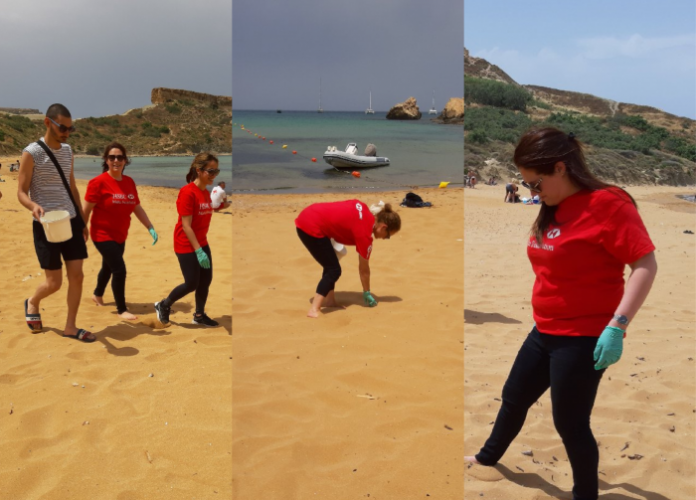HSBC Bank Malta employees have made use of the Bank’s voluntary leave scheme to
participate in two beach clean-ups organised by Nature Trust – Foundation for Environmental Education (FEE) Malta.
Acting on behalf of the HSBC Malta Foundation, the team of employees gathered almost 75 kilogrammes of waste from Għadira Bay in Mellieħa and Għajn Tuffieħa in Manikata.
As part of HSBC Bank Malta’s commitment to the community, the ‘Volunteer Leave Day’
scheme allows employees to apply for a day of leave, which is additional to the regular
annual leave entitlement. This day must be used to work for and help communities and
NGOs across Malta and Gozo. Volunteering opportunities are also made available to
employees through the HSBC Volunteering Platform.
During the two clean-up days, HSBC Malta volunteers collected a wide range of litter and trash from the two beaches, such as construction materials; metal and wooden objects; street signs, cigarette butts; remnants of fishing equipment, nets and ropes; and different plastic waste.
This initiaitive aligns with the Bank’s unwavering commitment to a net zero future. HSBC is playing a leading role in mobilising the transition to a global net zero economy, not just by financing it, but by helping to shape and influence the global policy agenda. HSBC recognises that our planet urgently needs drastic and lasting action to protect our communities, businesses and natural environment from the damaging effects of climate change.
Glenn Bugeja, Corporate Sustainability Manager at HSBC Bank Malta, said: “These two
clean-up days served as a real eye-opener on the work that still needs to be done to ensure we take collective responsibility for our environment. HSBC has always encouraged volunteering as a way for the Bank to remain an integral part of the community and the commitment of our employees continues to deliver real benefits to the community.”
Angelique Lofaro, Honorary General Secretary ay Nature Trust – FEE Malta, said, “Marine debris and litter all have a detrimental effect on our wildlife and ourselves. Whilst clean ups help to reduce the burden in one area, more effort needs to made by every single individual to reduce our negative impact on the environment. We need to reduce drastically our use of plastics, re-use an object as many times as possible, and dispose of it well when we can’t use it anymore. When in nature, we also have to shift to a mentality to leave the area cleaner than how we found it, even if it means picking up litter which is not ours. It may not be our litter, but it’s our planet.”










